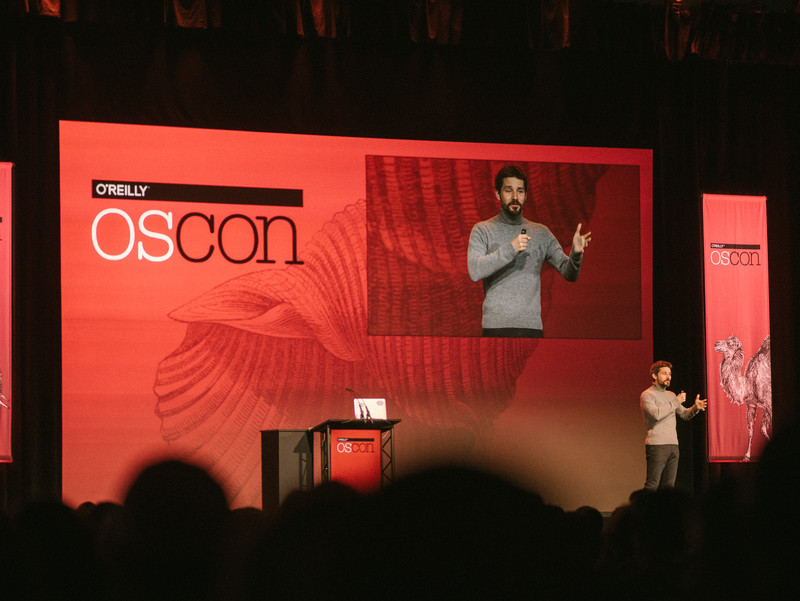O'Reilly OSCON 2016 Recap
Working at Lab Zero comes with many perks: adjustable standing desks with electric motors, tons of free food and drink, flexible schedules—and of course our annual trek to O’Reilly’s Open Source Convention (#oscon). Attending this great conference allows our various project teams to gain insights from the open source community. It also serves as a good barometer of how our industry peers are utilizing many of the tools and technical approaches we use for our clients.
This year, the keynotes and breakout sessions explored many themes, but the key takeaways were: diversity in the workplace, microservices, containerization and the Internet of Things (IoT).

Diversity
It was heartening to see that #oscon made a concerted effort to be an inclusive environment. Personally, half of the breakout sessions that I attended were presented by the underrepresented humans-in-tech we hear about. The only discouraging facts to come out of some of these talks is the news that the future pipeline of talent is only getting less diverse. Addressing this issue is something that I'd like to see a focus in future #oscon events (e.g. less reporting, more problem solving). We need to open source the revolution.
Highlights:
Microservices
Many speakers touched on the concept of moving the more monolithic parts of the stack into separate containers, encouraging us to move toward a more loosely-coupled service oriented architecture. As a framework-heavy dev shop, it's important to keep an eye on where efficiencies can be found by moving certain components outside of the main stack when it makes sense.
Highlights:
Plastics Containers are the Future
A whole slew of talks focused on Docker while others introduced us to the concept of the unikernel, a container stripped down to the bare minimum set of compontents to run a given microservice—and nothing more. (They could be a potential remedy for “dependency hell,” a place every developer and devops engineers knows all too well.)
Containers can potentially help us with our build pipeline by allowing us to create (and tear down) separate testable containers per feature branch, playing nicely into our agile approach.
Highlights:
- Unikernels and Docker: From revolution to evolution
- Effective Docker Swarm
- Better collaboration through tooling
Run, Falcor, Run (a.k.a. “Performant" is Not a Word)
Michael Paulson from Netflix offered a definition of the non-word “performant” (to paraphrase): “(n) fast, in whatever way the developer using the word cares to define fast.” He shared this bit of humor to frame an anecdote about how a manager asked him to make Falcor, a caching layer used by Netflix, faster. Paulson claims he didn’t lift a finger until he and his manager had first agreed upon a definition of “fast.”
He then walked us through a demo of the tools he used to measure performance in Falcor: Benchmarkjs, time and flame graphs, lots and lots of flame graphs. Using these measuring sticks, he proved that something considered conventional wisdom on the internet—that objects are faster than closures in Javascript—wouldn’t provide a noticeable improvement in Falcor, saving months of needless development (and associated risk).
Using the ESP8266 to build the Internet of Things
Based on Alasdair Allan’s bio alone, I would sign up to listen to him talk about anything, even (gasp!), the so-called “internet of things.” Despite the title, the talk was buzzword-free and jam packed with ambitious demos. The focal point was this Arduino-compatible WiFi-enabled chip, the ESP8266, something Allan sourced for $2 each (or $1.65 if you buy in bulk, with free 90-day shipping from China).
Demoing live, he rigged one of these things up to a breadboard, uploaded some firmware, got it on the conference WiFi and (almost) had it download the google home page. In another demo, he recreated an open version of the Amazon Dash button.
Takeaways
Containers, unikernels, microservices, diversity and IoT were all given heavy emphasis at the 2016 OSCON. We are looking forward into implementing many of the tools and approaches into our workflow in the coming months ahead. We've already started working on docker tooling and continuous integration enhancements and of course we’ve been big believers in the value of microservices and rubber-meets-the-road SOA for a while now. It's very encouraging to see last year’s ideas mature into tools we can use—right now.
Continue the conversation.
Lab Zero is a San Francisco-based product team helping startups and Fortune 100 companies build flexible, modern, and secure solutions.
